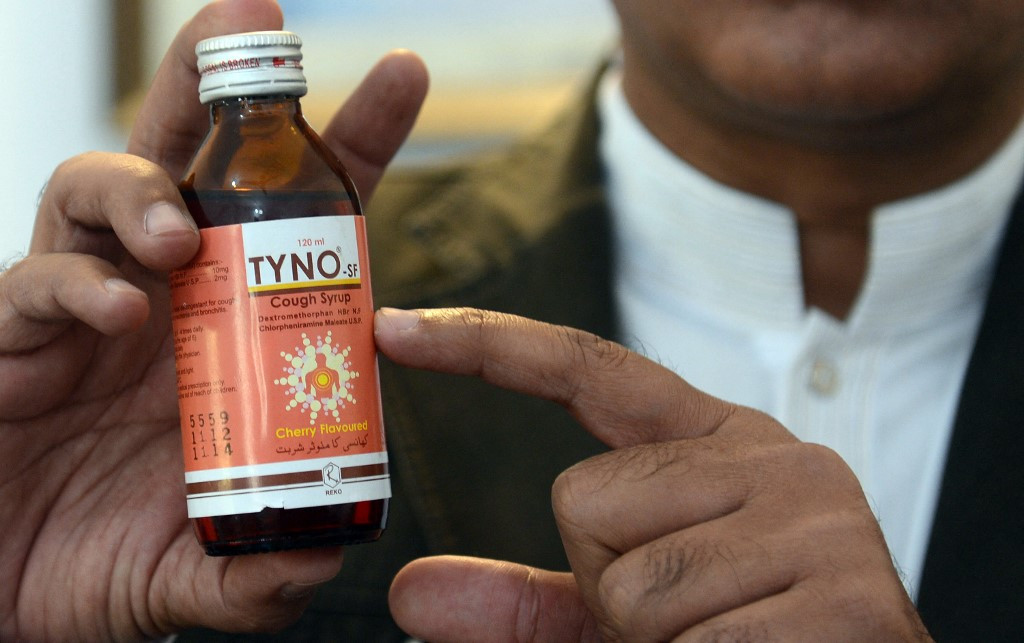Popular Reads
Top Results
Can't find what you're looking for?
View all search resultsPopular Reads
Top Results
Can't find what you're looking for?
View all search resultsUS FDA joins global regulators probing tainted overseas cough syrup
In a statement, the FDA said it had no indication that contaminated syrups had entered the US drug supply chain, but it is "investigating the potential impact and scope of this hazard on FDA-regulated products." The agency recommended consumers only take medicines which were made to be sold in the United States, especially for children.
Change text size
Gift Premium Articles
to Anyone
 A Pakistani health official holds a bottle of toxic cough syrup at a hospital in Lahore on November 26, 2012. At least 16 people have died after drinking a toxic cough syrup in the Pakistani city of Lahore, forcing authorities to close three pharmacies and a medicine factory, officials said. (AFP/Arif Ali)
A Pakistani health official holds a bottle of toxic cough syrup at a hospital in Lahore on November 26, 2012. At least 16 people have died after drinking a toxic cough syrup in the Pakistani city of Lahore, forcing authorities to close three pharmacies and a medicine factory, officials said. (AFP/Arif Ali)
T
he US Food and Drug Administration said on Wednesday it is working with the World Health Organization and foreign regulatory authorities to support an investigation into the source of contaminated cough syrups that have killed more than300 children in Africa and Asia.
In a statement, the FDA said it had no indication that contaminated syrups had entered the US drug supply chain, but it is "investigating the potential impact and scope of this hazard on FDA-regulated products." The agency recommended consumers only take medicines which were made to be sold in the United States, especially for children.
"The FDA is taking the international tragedy seriously and is making every effort to prevent contaminated product from entering the US market and to identify dangerous products that may have been brought into the US," the statement said. The inquiry also involves the US Centers for Disease Control and Prevention.
Earlier this week, the WHO said it had expanded its investigation into contaminated cough syrups linked to deaths from acute kidney injury in Gambia, Indonesia and Uzbekistan to four additional countries, and called on governments more widely to ensure that medicines for sale are approved by competent authorities.
Samples of the syrups, produced by six different drugmakers in India and Indonesia, were found to be contaminated with a known toxin, either diethylene glycol or ethylene glycol. The companies have either denied that their products have been contaminated or declined to comment while investigations are ongoing.
Reuters reported that the WHO is also investigating whether there is any connection between the manufacturers. In particular, the agency seeks more information about the specific raw materials used and whether they were obtained from any of the same suppliers.
The FDA said it was devoting increased oversight to syrups and other liquid medicines and has notified manufacturers and foreign regulators to remind them that products exported to the United States must meet good manufacturing practice requirements.
"Drug standards and regulations vary from country to country, and the FDA only has direct regulatory authority over the manufacture and distribution of products intended for use ... and sold inside the US," the statement said.
The WHO first issued an alert about the child deaths seen in The Gambia back in October, followed by one a month later focused on Indonesia and another earlier this month on Uzbekistan.
It has issued warnings against the use of cough syrups made by Indian firms Marion Biotech and Maiden Pharmaceuticals in connection with the deaths.
In its alerts, the WHO called on countries to boost efforts to detect and remove any contaminated medicines from circulation, up surveillance within supply chains and to immediately sound the alarm if any of the substandard products were found.
But on Monday, the UN agency stressed that "these are not isolated incidents", urging all parties involved in medical supply chains to take "immediate and coordinated action".
Regulators and governments, it said, should be working to spot and remove any substandard medical product identified by the WHO alerts.
They should also ensure that all medical products sold in their respective markets are approved for sale by competent authorities from authorised and licensed suppliers.
Medicine manufacturers meanwhile have a responsibility to "only purchase pharmaceutical-grade excipients from bona fide suppliers", the WHO said.









